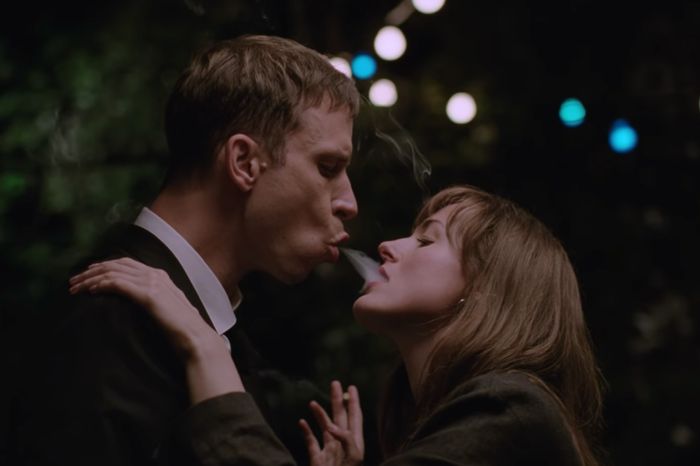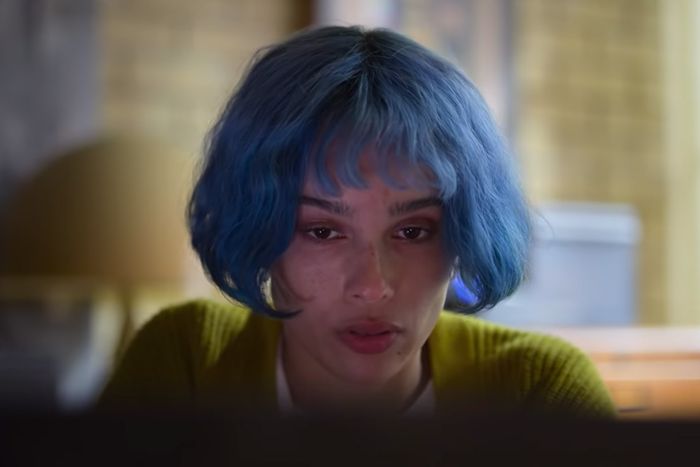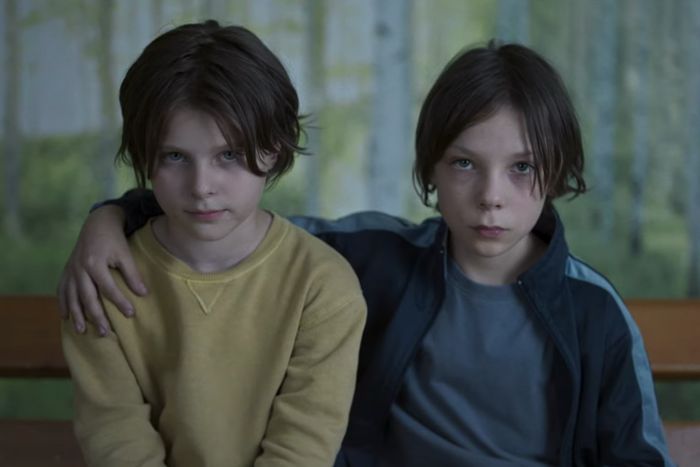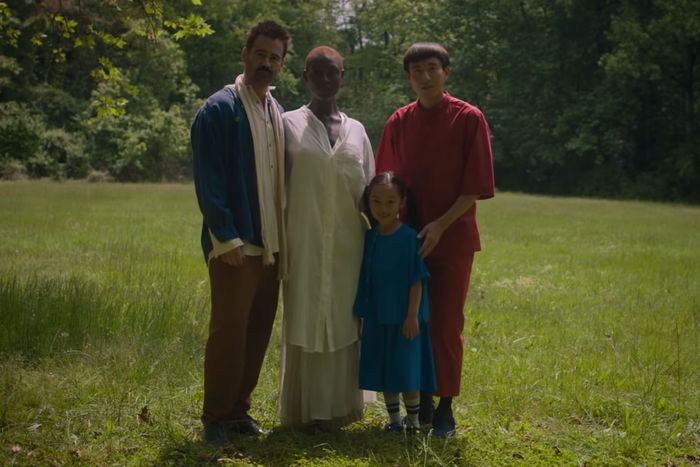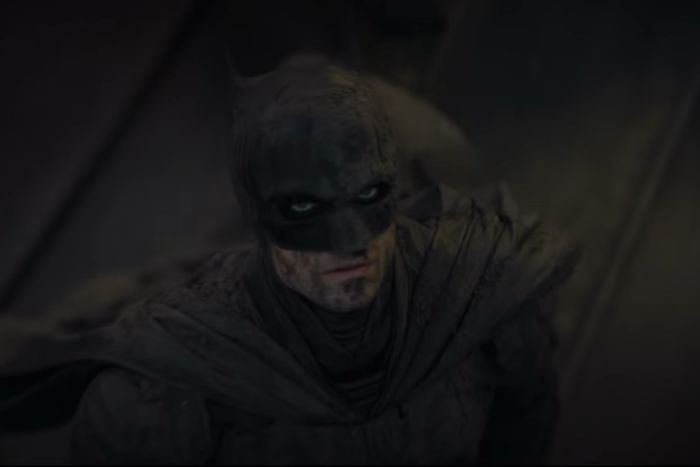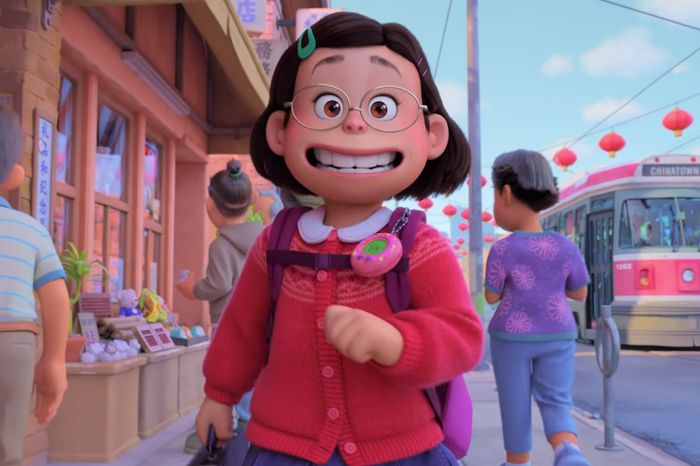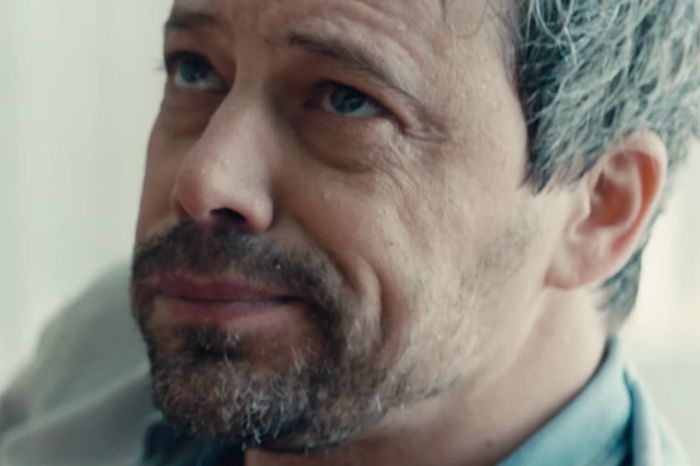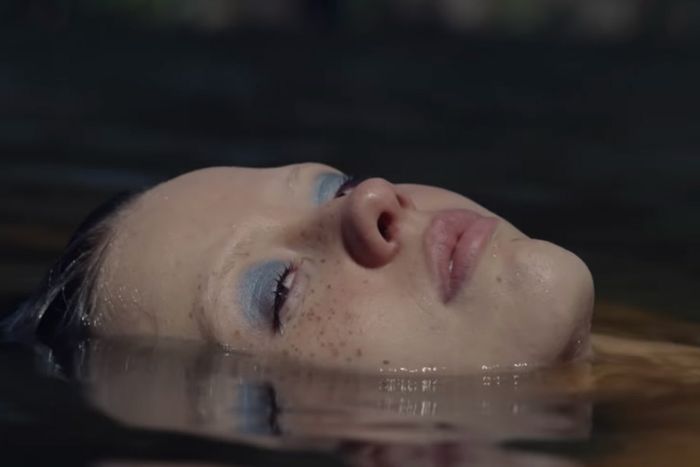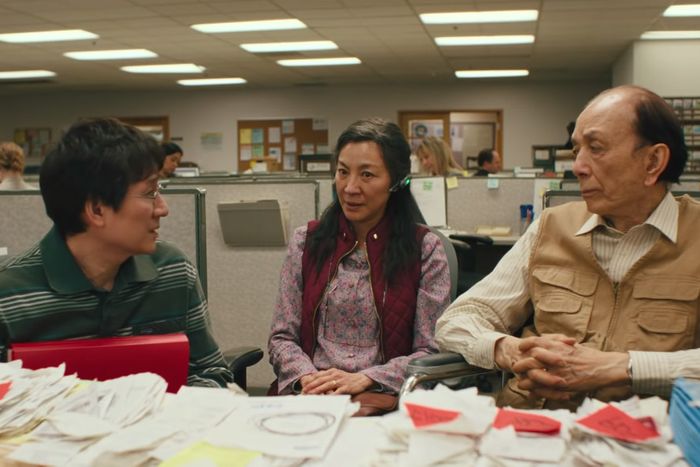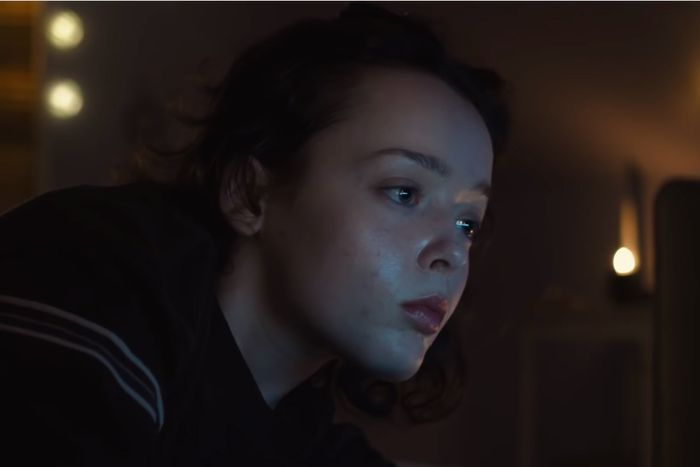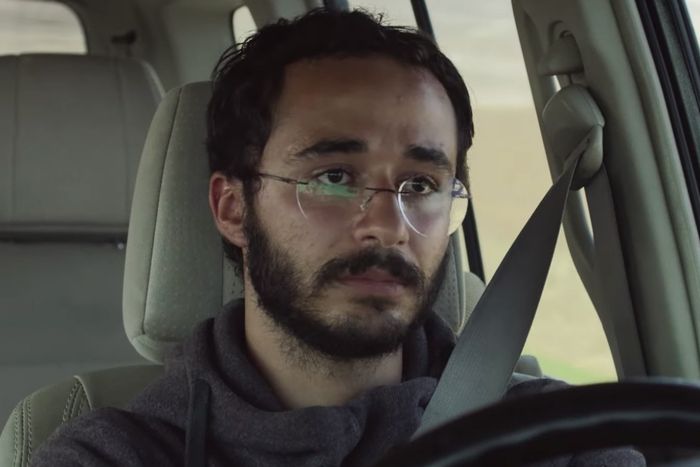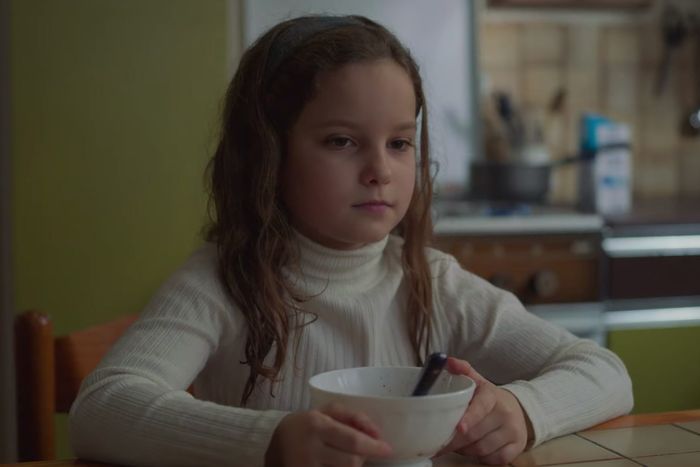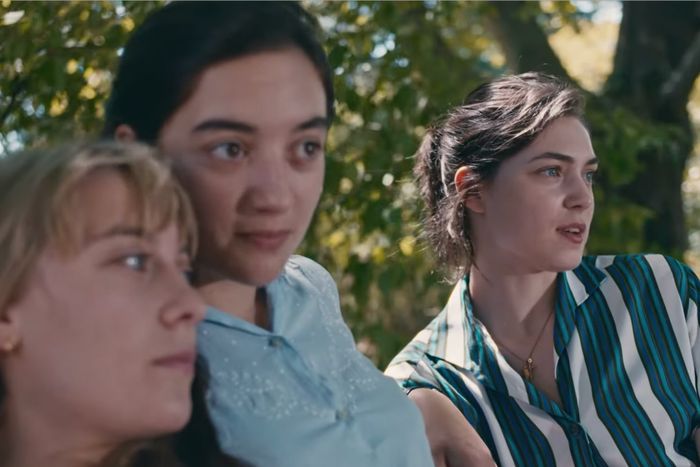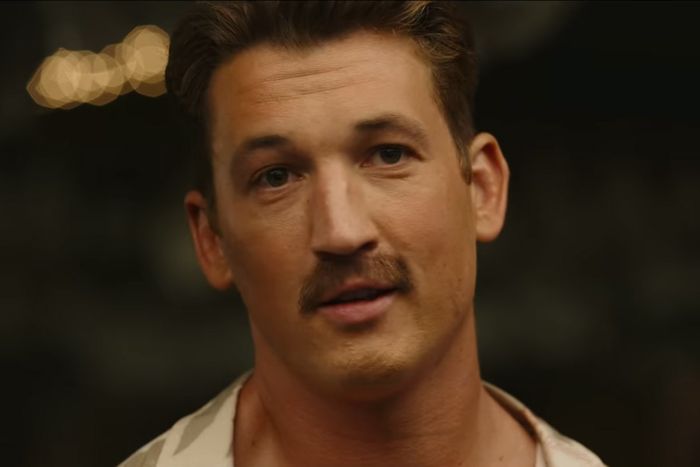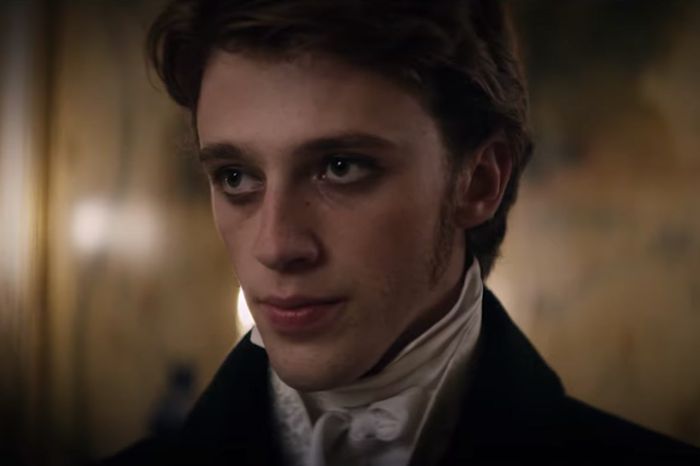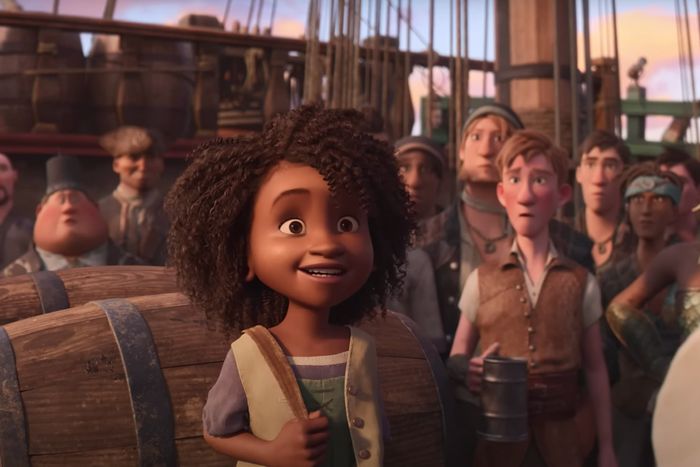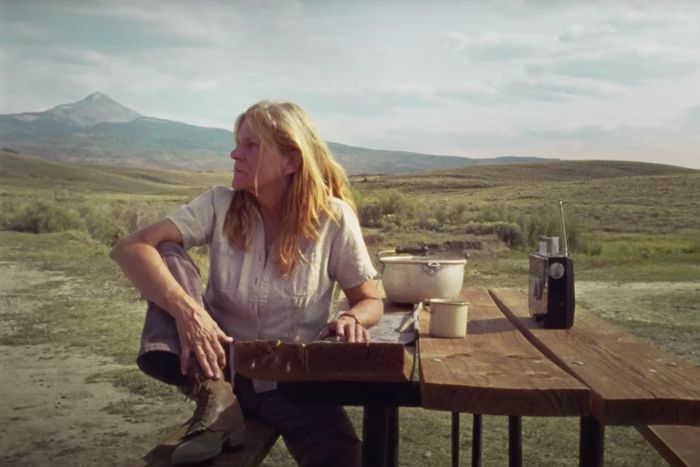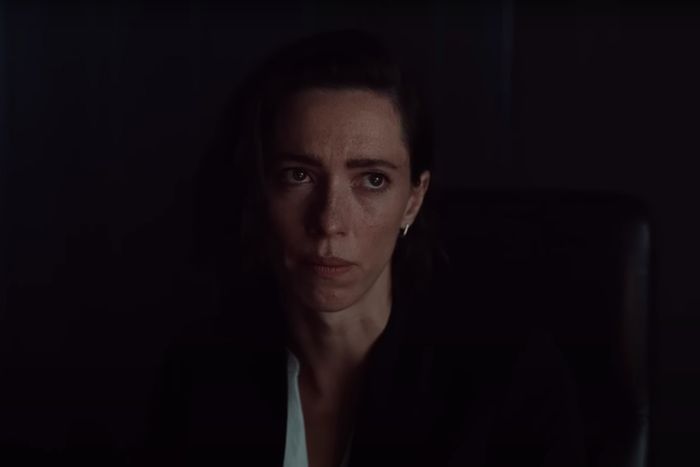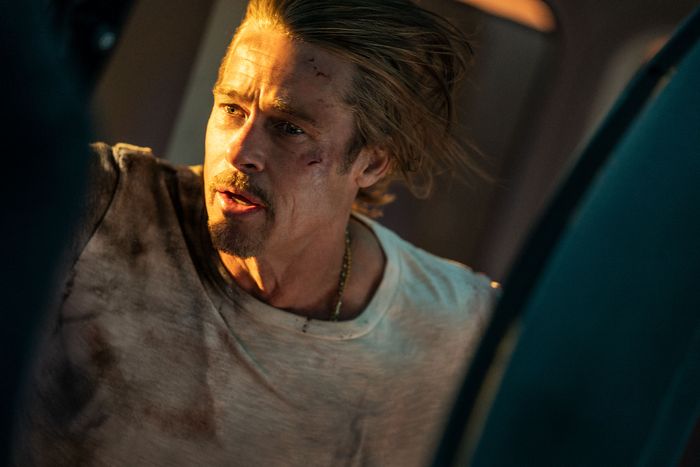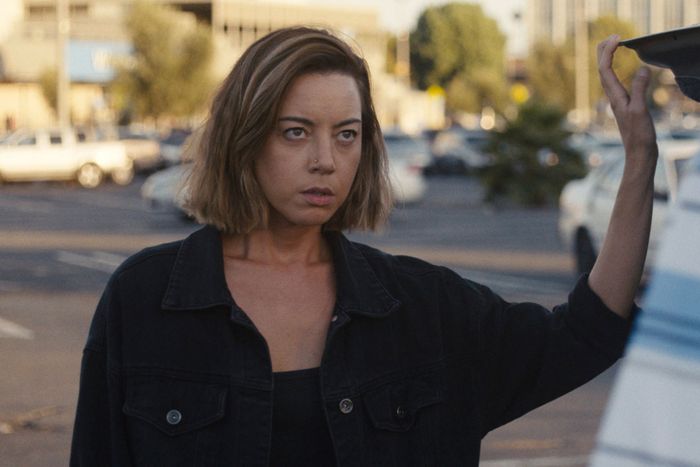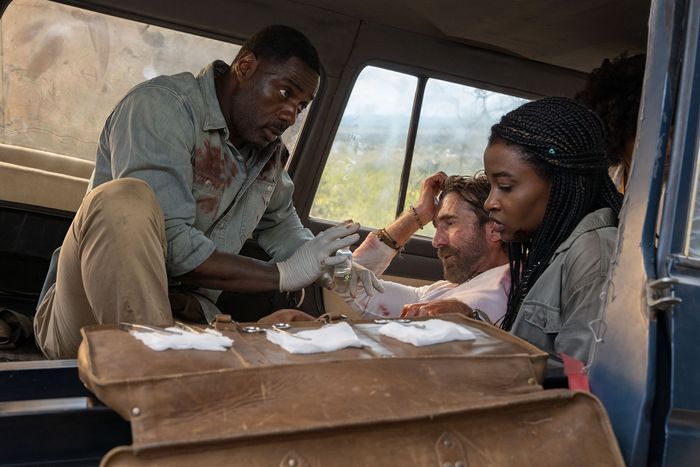The Best Movies of 2022

Photo-Illustration: Vulture; Photos Courtesy of the Studios
It’s summer. The sun is out. And it’s never too early to look back and count our blessings at the movies. The range of cinematic journeys we’ve experienced so far in 2022 so far are dizzying, from poignant hormonal awakenings (Turning Red) to an epic battle across multiple universes in (Everything Everywhere All at Once) to a 50-year-old madman’s doomed flight from a jumbo-sized cannon (Jackass Forever). And that’s just the start. Here are the best movies Vulture has seen and (for the most part) reviewed this year, according to our critics Alison Willmore, Bilge Ebiri, and Angelica Jade Bastién, arranged in unranked and chronological order.
Photo: スタジオ地図/STUDIO CHIZU/YouTube
A metaverse fairy tale and a wistful story of self-affirmation, the latest film from Mamoru Hosoda keeps one foot in a digital world that serves as an escape for billions of people around the world. One of them is Belle’s heroine, an unremarkable teenager from a fading rural community who, in her anonymous online life, has become a famous pop star. While Hosoda’s film uses Beauty and the Beast as its main inspiration, what makes it so compelling are the ways in which it plays the real and virtual off one other, diverging from the familiar contours of the classic story to show how even when we remake the world as a teeming new space where everything is possible, we bring all our pain and baggage with us. — Alison Willmore
Read Alison Willmore’s review of Belle and Rafael Motamayor’s interview with director Mamoru Hosoda.
Photo: Sony Pictures Classics/YouTube
There’s something startlingly intimate about Compartment No. 6. It lies not so much in the subject matter or the stylistic approach or even the themes of the movie. Rather, it’s in everything in between — in the way it captures a mood, an inexpressible sense of lostness and wandering that sets the viewer’s mind ablaze. Finnish director Juho Kuosmanen finds a way to make an old tale feel new, following two mismatched souls forced together during a long train ride from Moscow to Murmansk. Despite a disastrous first impression, the wiry and restive Ljoha (Yuriy Borisov) turns out to be surprisingly loyal and generous, and the understandably standoffish Laura (Seidi Haarla) starts to warm to him. Together, perhaps just for a brief moment, they find purpose and grace at the far edge of the world. — Bilge Ebiri
Read Bilge Ebiri’s review of Compartment No. 6.
Photo: Paramount Pictures/YouTube
Jackass Forever is a kinder, gentler Jackass, but thankfully, it’s not a more mature one. If anything, Johnny Knoxville and his merry band of gluttons for punishment have regressed, in the best way possible, utilizing the full array of modern filmmaking to portray some of the most sophomoric stuff ever put onscreen. Even so, what makes a Jackass stunt a Jackass stunt isn’t really the difficulty or the cleverness or the grossness of the activity, but the interactions among the perpetrators, victims, and spectators. First comes the stunt, then comes the agony and, finally, the camaraderie. There is a lot of hugging in Jackass Forever, believe it or not, and most of it feels sincere. While enormously fun, this is a more emotional movie than previous entries. You sense that among the people onscreen, and you might also sense it in the audience. Watching these middle-aged masochists keep hurting themselves for our pleasure reminds us of the passage of time. — B.E.
Read Bilge Ebiri’s review of Jackass Forever.
Photo: NEON/YouTube
The coming-of-age genre is usually saved for teenagers and people in their very early 20s, despite the fact that the nature of being human is to be in a constant state of flux. It’s why I find coming-of-age films focused on the turbulent decades of true adulthood so ripe — when the buildup of breakups, breakthroughs, accomplishments, and beliefs is starting to loom large. The Worst Person in the World, Joachim Trier’s final film in his loosely constituted Oslo Trilogy, sidesteps the arch emotional beats that define stories of very young people in love. It charts the growth of Julie (Renate Reinsve) from her 20s into her 30s and the relationships she has with two primary men in her orbit — first, Aksel (Anders Danielsen Lie), an older artist, and second, Eivind (Herbert Nordrum), a barista who catches her eye at a party she crashes. These characters aren’t neatly good people with perfect politics who say what they mean and mean what they say. They fuck up, in sometimes glorious ways, and are accountable for those fuckups. Trier’s approach to their stories is piercingly aware of the bruises we accumulate trying to become something more than our present selves. The story quietly washes over you until you realize you’re drowning in waves of acute emotions. — Angelica Jade Bastién
Read Angelica Jade Bastién’s review of The Worst Person in the World.
Photo: MUBI/YouTube
It’s no wonder, given the forever-uncertain state of access to the procedure in the U.S. and around the world, that the abortion thriller has blossomed into its own potent subgenre. Its latest entry come from Chadian filmmaker Mahamat-Saleh Haroun and is centered on Amina (Achouackh Abakar Souleymane), a single mother who discovers her 15-year-old daughter, Maria (Rihane Khalil Alio), is pregnant. But for a movie hinging on whether or not a character will be able to illegally end her unwanted pregnancy, Lingui, the Sacred Bonds becomes almost ebullient as the determined Amina, in trying to help her child, starts to shed the shame and the allegiances that have weighed her down for so long. Haroun’s film portrays the patriarchal structures that entrap women but also shows the ways in which those women are able to work around them together. — A.W.
Photo: Matchboxfilmsuk/YouTube
Left without a U.S. distributor for years, this melancholy 2009 Hirokazu Kore-eda film is the myth of Galatea by way of a sex shop, with a sublime Bae Doona playing an inflatable doll who comes to life when her owner is away and eventually drifts into a part-time job and a relationship with a co-worker. Like the alien in Under the Skin, the protagonist of Air Doll is an otherworldly outsider who first observes humanity and then makes an ill-fated attempt to become part of it, getting exposed to humanity’s capacity for cruelty in the process. — A.W.
Photo: HBO Max/YouTube
Steven Soderbergh’s latest is a fleet-footed, gorgeously made suspense movie about an agoraphobic tech contractor who hears what she believes to be a rape when analyzing audio from an Alexa competitor. As the isolated Angela Childs, Zoë Kravitz is both prickly and vulnerable, upset that she’s not able to push past her own trauma and just return to normal alongside the rest of the world — until she believes she has no choice but to force herself outside and into a conspiracy that’s both horrifying and tawdry. — A.W.
Read Alison Willmore’s review of Kimi.
Photo: New Wave Films/YouTube
Playground begins and ends with an embrace, but between those two instances of tenderness lies a nerve-shredding, incredibly well-acted 72-minute drama set in the guilelessly cruel world of young children. There have been lots of movies about bullying, but I’m not sure I’ve ever seen one like Laura Wandel’s, which is shot, cut, and performed with an immediacy that puts us inside the queasy, terrified mind of a 7-year-old girl. The film’s child’s-eye perspective is so relentless we almost never see a parent or teacher’s face unless they’re leaning down or sitting at our protagonist’s level — a striking visual correlative to the general helplessness of the adults around these kids. Playground is a tough watch, but it’s also an essential one. — B.E.
Read Bilge Ebiri’s review of Playground.
Photo: MGM Studios/YouTube
Cyrano is, technically speaking, Joe Wright’s first musical film, but you could say he’s been making musicals his entire career. As it begins, you sense a director fully in his element, able to weave in and out of bursts of song and snatches of dancerly movement without ever fully disappearing into the realm of the unreal. Starring Peter Dinklage and adapted from Edmond Rostand’s classic 1897 play, Cyrano de Bergerac (with a central conceit from Erica Schmidt’s 2018 stage musical), the movie sings even when nobody’s singing: Characters speak as if guided by internal meters, and they move with brisk, purposeful precision. When they do burst into song and dance, it feels organic and natural, like everything’s just tipped one slight degree into the fantastical. Cyrano is a delicate dream of a movie, the kind of film that feels like you might have merely imagined it — light on the surface but long on subconscious impact. — B.E.
Read Bilge Ebiri’s review of Cyrano.
Photo: Movie Trailers Source/YouTube
Any true fan of disaster flicks would do well to check out this Norwegian release, which is being billed as a sequel of sorts to modern-day classics The Wave (2015) and The Quake (2018) from the same country. It does share a director with the latter — John Andreas Andersen — but it’s a far more sober and intimate film than either of its predecessors, relying more on tension than spectacular, over-the-top devastation. This time, a Norwegian offshore-drilling company is sent into a tailspin when it discovers that a horrific accident on one of their rigs might actually be the start of a once-in-a-millennium seismic event that will cause a massive oil leak. Their solution: to light the North Sea on fire in order to burn up all the oil before it can spread out and destroy the European coastline for generations. Unfortunately, one of our heroes is trapped on one of the rigs in the middle of this flaming cataclysm. The results are intensely dramatic — more survival flick than disaster porn. — B.E.
Photo: Yellow Veil Pictures/YouTube
A beguiling mix of science fiction, ghost story, and spiritual meditation, Mattie Do’s third feature is set in a rural Laotian village to which the future has brought a scattering of technological advances but few solutions for the economic stagnation driving new generations to the city for work. Yannawoutthi Chanthalungsy is the unnamed protagonist, a man who’s always been able to see the dead but who only learns as an old man that the ghost who’s been his companion since he was young has the ability to take him back in time. The Long Walk is about someone trying to fix the past, with all kinds of unforeseen consequences. But it’s also a moody portrait of someone so sure he knows how to help those in need that he can’t actually see the monstrosity of his actions. — A.W.
Photo: A24/YouTube
Kogodana’s latest is an exquisitely melancholy movie about the life and death of a robot, but it’s also about finding significance in the moments and textures of a mundane existence. Jake (Colin Farrell) and Kyra (Jodie Turner-Smith) purchased Yang (Justin H. Min) to help their adopted daughter Mika (Malea Emma Tjandrawidjaja) connect to her Chinese heritage, but never fully appreciated the place he occupied in their family until he stops working. In trying to get the secondhand companion android repaired, Jake discovers Yang had a whole inner life and history that leads him to reconnect with his own existence. After Yang’s meditative power owes so much to vividness of the near-future the film conjures up, a sun-dappled world that still feels tender from offscreen schisms distant enough to be memories but near enough to still be felt. — A.W.
Read Alison Willmore’s review of After Yang.
Photo: Warner Bros. Pictures/YouTube
You might have thought Batman couldn’t get any darker, but you’d be wrong: Heath Ledger’s Joker in The Dark Knight sewed a telephone into a guy’s abdomen in 2008 so that Paul Dano’s Riddler could then feed another guy’s abdomen to a cage full of rats in 2022. This is a Batman movie reimagined as a grisly serial-killer film, only this time it’s not just the serial killer who looms in the shadows, watching his prey and waiting to pounce; the hero does, too. The typical superhero movie’s subtext about the subtle similarities between the good guy and the bad guy here becomes overt text, as director Matt Reeves shoots Batman’s pursuit of his targets with the same psychotic, heavy-breathing, point-of-view aesthetic with which he shoots the Riddler’s. Now, we have to try and figure out how the hero differs from the villain — and so too does Batman. That’s part of the film’s charm: watching a familiar, oft-filmed superhero try and discover just what it is that constitutes heroism — a question that finds its answer during a moving climax that has almost nothing to do with tracking down bad guys or pummeling people. As a result, The Batman’s darkness never feels fashionable, or opportunistic, or cheap. Reeves loves these dead-end apocalyptic environments and delights in tales that toy with the moral calculus of typical hero narratives. He has given us a Batman that he himself can believe in, not to mention a Batman that feels right for our times. — B.E.
Read Bilge Ebiri’s review of The Batman.
Photo: Madman Films/YouTube
Sebastian Meise’s searing prison drama follows the life of Hans Hoffmann (Franz Rogowski, in a haunting performance), a gay man and prison camp survivor for whom Germany’s liberation after WWII didn’t seem to make all that much of a difference. The postwar German government still kept laws criminalizing homosexuality on the books, thus resulting in him being sent straight back to prison. By juggling time periods and keeping the action largely confined to life behind bars, Meise has crafted an unusually (and beautifully) suffocating film. As we shuffle through scenes from Hans’s incarceration in the 1940s, the 1950s, and the 1960s, we feel like we’re very much stuck there with him. But the film is not without humanism: Much of it charts the growing friendship between Hans and Viktor (Georg Friedrich), an addict whose initial disgust at his fellow inmate eventually transforms into solidarity, respect, and a kind of love. — B.E.
Photo: IFC Films/YouTube
Palestinian director Hany Abu-Assad’s extremely gripping drama begins with a matter-of-fact depiction of a conspiracy so strange and shocking it takes a second to regain your bearings after witnessing it. Reem (Maisa Abd Elhadi), a female customer in a hair salon run by Huda (Manal Awad), is casually drugged, stripped naked, and photographed in a compromising position. Then, Huda uses the pictures to force Reem into spying for the Israeli secret service, part of an ongoing operation that has pulled many terrified women into its web. Huda’s blackmail scheme works for one simple reason: These women live in a world where just the hint of adultery — even if unproven, or for that matter disproven — is a life-shattering one. The ensuing film intercuts between two narrative strands: Huda, caught by the Palestinian resistance, is interrogated in a dark basement, while Reem desperately searches for a way to clear her name. Abu-Assad has made his share of films about the cruel absurdity of life under Israeli occupation, but here he lets all sides have it. These women are oppressed by everybody. Even though the story unfolds in linear time, as we watch these two female protagonists’ journeys, we begin to realize Reem is going through a version of what Huda herself did once upon a time. The intimate, slow-burning frustration of these two women’s predicaments builds and builds until we ourselves start to feel like we’re stuck in a dark prison of the soul. — B.E.
Read Bilge Ebiri’s review of Huda’s Salon.
Photo: Pixar/YouTube
As exuberant and unapologetically weird as its 13-year-old heroine, Domee Shi’s Pixar feature debut effortlessly combines generational trauma and adolescent hormonal awakenings, ancestral inheritances and boy band fandom, and all in a pastel-hued Toronto that, for once, gets to play itself. What makes Turning Red so joyous and also heartrending is the way it takes Chinese immigrant archetypes — the tiger mom, the good daughter — and explores the individuals behind them, finding a lonely woman repeating her own mother’s mistakes despite herself, and a young woman so determined to please the parent she adores that she’s ready to start punishing herself for not being perfect. Also, the panda is adorable, and the big panda showdown is a splendid mix of the absurd and the emotional. — A.W.
Read Alison Willmore’s review of Turning Red.
Photo: Kino Lorber/YouTube
Israeli director Nadav Lapid’s latest abrasive moral drama follows a hotshot, award-winning director, Y (Avshalom Pollak), as he flies to the remote, dusty Arava Valley to screen one of his films to a small-town audience. He is met by Yahalom (Nur Fibak), a young, cheerful bureaucrat who works at the Ministry of Culture and asks him to sign a form declaring the subject of the film he’s screening. The document is a mere formality, but it sets Y — who is clearly a surrogate for Lapid himself — off. Not just because of the moral dilemma he faces in signing it, but also because of the paradox he senses in Yahalom, a smart, kind young woman who understands the inherent corruption behind this type of low-key censorship but nevertheless performs her job with pleasant professionalism. Interesting setup, but what makes Ahed’s Knee so powerful is the way the movie detonates before our eyes. The rage and doubt gnawing away at Y’s conscience spill over into an extended flashback, numerous dance sequences, and, ultimately, a blistering monologue – a trancelike, spittle-flecked, apocalyptic screed that practically takes the movie hostage. But Lapid reserves perhaps the greatest condemnation for himself, for Y is also revealed to be a manipulative, duplicitous, even hypocritical mess. And so the film asks: At what point does constant aggrievement become its own toxic form of aggression? At what point does rage become cruelty? And at what point does merely going about one’s business perpetuate great evil? Humanity has never had easy answers to such questions, and neither does this movie. — B.E.
Read Bilge Ebiri’s review of Ahed’s Knee.
Photo: A24/YouTube
Sex and violence are two of the movies’ most reliable spectacles, and Ti West’s latest — his first in six years — offers up plenty of both by sending an amateur film crew out to a rural Texas farm to shoot a porn film, without telling the enigmatic elderly couple they’re renting from what their plans are. But X has more on its mind than just basking in the tropes of the classic slasher. It also interrogates the conservatism at the genre’s core by having its carnage be fueled by envy rather than by a sense of moral punishment, with Mia Goth doing double duty as aspiring sex symbol Maxine and as the despondent older woman Pearl. — A.W.
Read Alison Willmore’s review of X.
Photo: Cinematheque Trailers/YouTube
The most riveting film you’ll ever see about three Romanian social workers stuck in the mud. In Radu Muntean’s absorbing and bizarre drama, a mission to deliver food supplies to a remote region of Transylvania is derailed when the aid workers decide to pick up an elderly villager, who promptly sends them down the wrong path, resulting in their SUV being bogged down along the way. Assorted attempts to get the car out of the mud simply make matters worse, and the situation escalates both emotionally and physically. It all feels like a metaphor for something — institutional failure, perhaps, or the cocoon of bourgeois privilege, or the futility of temporary gestures. But that doesn’t really do justice to the film’s psychological acuity, to its lived-in sense of drama and its sharply-drawn characters. Muntean is a master of putting ordinary people in circumstances that gradually force them to reveal who they are, without it ever feeling forced, heavy-handed, or opportunistic. — B.E.
Photo: A24/YouTube
Shave ten to 15 percent off of Dan Kwan and Daniel Scheinert’s second film and you’d have a stone cold masterpiece. As is, Everything Everywhere All At Once is still pretty damn wonderful, an epic battle across multiple universes as well as a startlingly sad portrait of an immigrant family on the verge of collapse. Michelle Yeoh is splendid as Evelyn Wang, a beleaguered laundromat owner whose marriage is failing, whose daughter Joy (Stephanie Hsu) is drifting away, and who is in the midst of getting audited by a joyless administrative ghoul played by Jamie Lee Curtis. But the real standout is former child actor Ke Huy Quan, of Indiana Jones and the Temple of Doom and The Goonies. As Evelyn’s whimsical husband Waymond, he’s the heart of the film, and he’s the star of a fanny pack martial arts battle that’s guaranteed to be one of the year’s best action setpieces. — A.W.
Read Alison Willmore’s review of Everything Everywhere All at Once and Bilge Ebiri’s interview with star Ke Huy Quan.
Photo: Pen Movies/YouTube
The American blockbuster may be stuck in a moribund state, beholden to IP and boring, samey visuals, but this Telugu epic is proof that in other parts of the world, glorious excess is still possible. S. S. Rajamouli’s historical drama creates a fictional backstory for real revolutionaries Alluri Sitarama Raju (Ram Charan) and Komaram Bheem (N. T. Rama Rao Jr.) by having their paths cross in 1920s Delhi, where they become fast friends, not knowing they’re on different sides of the colonial divide. Or are they? RRR is three hours of pure, uncut entertainment, with plot songs, outrageous action setpieces, awkward courtships, gleeful violence, tearful betrayals, and a musical number dance-off in front of an audience of snobby Brits. If you don’t tear up with joy at the spectacle of one of the heroes crashing a truck through the gates of the governor’s compound to release a barrage of CGI wild animals into a party, then check your pulse — you may be dead. — A.W.
Photo: IFC Films/YouTube
In between Shakespeare and video game adaptations, Justin Kurzel has been a reliable chronicler of Australia’s history of violence, beginning with Snowtown in 2011 and continuing with True History of the Kelly Gang in 2019. But Nitram, a portrait of the perpetrator of the 1996 Port Arthur shooting, feels like the culmination of Kurzel’s interests in the mundanity of evil. A mesmerizing Caleb Landry Jones plays the title character, a lonely, disturbed man with a penchant for perverse acts of provocation. Nitram immerses the viewer in his experiences, which veer between the pathetic and the repellent, a tightrope walk of empathy without sympathy. — A.W.
Read Roxana Hadadi’s review of Nitram.
Photo: ATOMS & VOID/ Films by SERGEI LOZNITSA/YouTube
The Ukrainian director Sergei Loznitsa made headlines a few weeks ago when he was expelled from the Ukrainian Film Academy for opposing a boycott of all Russian films and directors — this, after he himself had resigned from the European Film Academy for its weak response to Russia’s invasion of his country. But Loznitsa himself suspects that the real reason for his expulsion was because some were upset over this devastating documentary about the Nazi invasion of Ukraine and the notorious massacre of Kyiv’s Jews that occurred at the Babi Yar ravine on the city’s outskirts. Using footage entirely shot by cameramen of the time, Loznitsa tells the story of the city’s capture and the monstrous events that followed, but he also shows how complicit many ordinary citizens were in helping perpetrate the Nazis’ crimes. Ultimately, what Babi Yar. Context shows is how the uncontrollable poison of war always spreads far beyond the battlefield and those fighting on the front lines. — B.E.
Photo: Utopia/YouTube
Somewhere between a horror film and a coming-of-age story, Jane Schoenbrun’s film has an incredibly complex understanding of the internet as a medium for connection, community, misunderstanding, and performance. Casey (Anna Cobb), a solitary teenager, embarks on a creepy viral challenge that’s rumored to have caused physical and psychological changes in its participants. As the videos she posts become increasingly disturbing, a lonely middle-age man (Michael J. Rogers) reaches out to her, claiming to be concerned for her well-being. The exchanges between them serve as reminders that online presences are the tips of icebergs, only glimpses of lives that remain unseen and unknowable off screen. — A.W.
Photo: kinolorber/YouTube
There have been some epic child performances this year — see the Céline Sciamma film just a few items below this one — but nothing compares to Rayan Sarlak’s turn as the motormouthed younger son in Hit the Road. The first film from writer-director Panah Panahi, child of the great Iranian auteur Jafar Panahi, Hit the Road features a lot of impressive acting, from Hasan Majuni’s dryly hangdog role as the injured patriarch of the central family to Pantea Panahiha as the mother maniacally trying to hide her distress as they head toward the Turkish border to smuggle older son Amin Simiar out of the country at a terrible cost. But Sarlak, gleeful, impulsive, and chaotic, is a force of nature who can’t be controlled, only corralled in a particular direction, a wildly charismatic kid who embodies the film’s bold swings from humor to anguish. — A.W.
Read Roxana Hadadi’s review of Hit the Road.
Photo: Focus Features/YouTube
Give Robert Eggers his due — while the filmmaker has gotten acclaim for the in-depth research he’s put into re-creating historical details onscreen in works like The Witch and The Lighthouse, it’s the way he re-creates the mind-sets of the past that really impresses. The Northman, adapted from the Scandinavian legend that inspired Hamlet, is a Viking saga that feels downright alien in its priorities. As the exiled prince Amleth, Alexander Skarsgård is a hulking force of revenge for whom dying in battle is the whole point of existence. As his mother, Queen Gudrún, Nicole Kidman offers an off-the-rails monologue for the ages. There are berserker ceremonies, acts of self-branding, battles with undead warriors, and a nude fight in the shadow of a volcano — plus, Björk plays a witch. It’s hard to imagine any other movie this year going quite so hard. — A.W.
Read Alison Willmore’s review of The Northman and Nate Jones’s interview with the director, cast, and crew about the hardest days on set.
Photo: Madman Films/YouTube
Delicate, diminutive, and perfect, Céline Sciamma’s Petite Maman deploys a simple premise to devastating ends. While on a trip to clear out her late grandmother’s house, young Nelly (Joséphine Sanz) discovers that she’s able, through some kind of magic thankfully left mysterious, to visit her mother back when she was 8 year old herself. As an adult, played by Nina Meurisse, Marion is loving but aloof, awash in melancholy Nelly struggles to understand. But as a child, played by Gabrielle Sanz, she’s as open as Nelly is herself, unguarded about her fears and her dreams for the future. Sciamma gets miraculously good performances from the Sanz sisters, who often don’t seem to be acting at all so much as just being at play. Their characters’ impossible interlude together is touching without ever being cloying.
Read Alison Willmore’s review of Petite Maman.
Photo: Utopia/YouTube
Gaspar Noé’s Vortex is perhaps the most human movie he’s ever made. And yet, somehow, it’s also the cruelest. It may not have the extravagant violence of his earlier efforts, but there’s an unflinching, near-clinical relentlessness to the picture. Inspired partly by events in the director’s own life, it follows an elderly couple as they cope with frailty and dementia. The movie unfolds in split screen, as if to embody the increasing psychic distance between them — each character effectively in their own world. It’s visually striking and quite beautiful, but also profoundly unsettling. All too often, films about such struggles try to sugarcoat their stories, to alleviate the grim (and very real) subject matter with coy evasion and elevate it through magical thinking and spiritual overtones. Noé, being Noé, goes in the opposite direction: He rubs our faces in it. But do not mistake this relentlessness for coldness or distance. Every second seethes with emotion of an intensely personal kind. This is a director confronting the darkest, saddest corners of his mind. — B.E.
Read Bilge Ebiri’s review of Vortex and Simon Abrams’s interview with star Dario Argento.
Photo: IFC Films/YouTube
The power of Audrey Diwan’s abortion thriller, based on a novel by Annie Ernaux, comes from how closely it immerses its viewer in the growing desperation felt by its main character, a gifted university student named Anne (Anamaria Vartolomei) who can see her possibilities narrow with every week that she remains pregnant. Anne’s future hangs in the balance, but her predicament is treated as her problem and hers alone by everyone she confides in, from callous doctors to the friend who tries to initiate sex, telling her there’s no risk now that she’s already knocked up. Vartolomei’s eyes project an animal panic, conveying what it means to feel trapped by your own body, and by a society’s indifference. — A.W.
Photo: Walt Disney Studios/YouTube
While it doesn’t quite manage to actually ding the House of Mouse, this meta-comedy from the Lonely Island’s Akiva Schaffer about the swashbuckling chipmunk duo might be as close to subversive as a Disney production is able to get. Andy Samberg voices the goofball Dale, who’s gotten “CGI surgery” in order to keep riding out the waning vestiges of his fame at fan conventions, while John Mulaney serves as the straightlaced Chip, who’s left showbiz for a staid insurance job. The story the reunites the pair serves as a riff on Who Framed Roger Rabbit, but it’s really just an excuse to stuff the film full of clever visual gags and tossed-off references, from the Valley being filled with uncanny CGI creations to the villain being a middle-aged Peter Pan who’s outgrown his lithe (animated) child star charm. — A.W.
Read Alison Willmore’s review of Chip ’n Dale: Rescue Rangers.
Photo: kinolorber/YouTube
Self-taught filmmaker Ajitpal Singh’s directorial debut has the deftness of a practiced artist, and an astounding nuance in how it portrays the life of Chandra (Vinamrata Rai), a tireless woman running a guest house for tourists in a Himalayan village to which long-promised progress never seems to arrive. Chandra carries her family on her back — literally, in the case of her son, who’s been faking immobility to avoid having to go back to school, where he’s bullied. Chandra’s husband is a foolhardy drunk, and her widowed sister-in-law is embittered. And yet it’s through her relationship with her teenage daughter Kanchan (Harshita Tiwari) that the film shows real complexity. Chandra may understand the unfairness of her position, and of the patriarchal structures that maintain it, but she can’t bring herself to encourage Kanchan in her academic successes, out of a messy resentment for the idea that the girl might actually get to climb to something more. — A.W.
Photo: Paramount Pictures/YouTube
The first thing to know about Top Gun: Maverick is that it is enormously entertaining, with spectacular aerial stunts that are unlike anything that’s been put on film before. But watching this sequel to a 36-year-old blockbuster also makes for a surprisingly emotional experience. That’s partly due to what happens onscreen, in particular Tom Cruise’s unusually moving return to the part that initially made him a global superstar. But a lot of it also has to do with the memories the film evokes — memories not just of the first movie but of everything that has happened to the world, and to us as viewers, since then. Director Joseph Kosinski, who in previous efforts like Tron: Legacy and Oblivion found a kind of cinematic poetry in liminal spaces, imbues the empty deserts and vacant terrain against which these pilots’ jets soar with a melancholy that becomes almost symbolic. The image of America from the original Top Gun still haunts the empty spaces of the new movie. Don’t be surprised if you leave the movie in tears. — B.E.
Read Bilge Ebiri’s review of Top Gun: Maverick.
Photo: Film Forum/YouTube
Originally made in 1984 by the German American independent director Michael Roemer, this haunting family drama is finally getting a theatrical release. (In its day, it ran on PBS’s American Playhouse to poor reviews and little viewer interest.) It follows Jo (Brooke Adams), a recently divorced woman briefly returning to her family home in a coastal New England town after a long time away. An outcast in her own family, she soon drifts into the lives of the family next door, where she finds a simmering cauldron of resentment and mental illness. This is the stuff of high melodrama, but it’s delivered with artful understatement: Director Roemer understands that around other people, we try to submerge our turmoil. The film is a genuine discovery, and it makes Roemer 3-for-3 when it comes to belated appreciation. Two previous films, Nothing But a Man (1964) and The Plot Against Harry (1969), were largely forgotten in their day and have become classics since. Vengeance Is Mine seems headed for the same fate. — B.E.
Read Bilge Ebiri’s review of Vengeance Is Mine.
Photo: Roadsideflix/YouTube
Terence Davies’s Benediction follows the life of the British poet Siegfried Sassoon, whose harrowing experiences during WWI led to some of the most beautiful words ever written in the English language as well as a lifelong struggle to connect with others. But to call this a biopic would be giving biopics a bit too much credit. Davies is one of the most expressive of directors, but he’s always scratching away at something seemingly inexpressible. Early on, we see young Siegfried (Jack Lowden) attend a 1914 performance of Stravinsky’s The Rite of Spring, and the curtain of the theater rises to reveal a special effect: silent-movie footage of idyllic British scenes that then gives way to newsreel images of young men signing up for military service, as we hear Sassoon’s poetry in voice-over. We sense the sadness and the gathering doom, of course, but there’s something more here. The film suggests that the writer’s eventual feelings of loss, meaninglessness, and inadequacy were generational, historic, maybe even metaphysical. His loneliness could stand in for the immense loneliness of all the generations caught in the endless shockwave of the old world blowing its brains out. But like many others, his loneliness was also compounded by a society that refused to accept him as he was. — B.E.
Read Bilge Ebiri’s review of Benediction.
Photo: PalaceFilms/YouTube
Xavier Giannoli’s handsome adaptation of Honoré de Balzac’s mid-19th-century novel won a slew of Césars in France, including Best Picture. And while such a pedigree may suggest something stately, mannered, and, frankly, a little boring, the film turns out to be a fast-paced, surprisingly dishy melodrama with at least one spiritual foot in the present. The film follows the fortunes of Lucien de Rubempré (Benjamin Voisin), an aspiring poet from the provinces who lands a job at one of Paris’s thriving small newspapers, where he gets a rather dispiriting introduction to how journalism works: Various patrons pay to viciously take down or effusively promote different subjects, and each article is up for the highest bidder. But it’s not just the newspaper industry that works in this way. Up and down the social chain, different political factions and tribes and papers and writers and publishing houses constantly war with one another, all gleefully partaking of the moral rot at the heart of this culture — even as everyone adheres to strict codes of behavior and propriety. Giannoli takes us on an enjoyable journey through the workings of this society in the way he might show off an intricate, newfangled machine, with equal parts fascination and outrage. The results are hugely entertaining. — B.E
Read Bilge Ebiri’s review of Lost Illusions.
Photo: Netflix/YouTube
In Joseph Kosinski’s film of George Saunders’s short story “Escape From Spiderhead” (adapted by Paul Wernick and Rhett Reese, probably known best for their screenplay for Deadpool), a group of inmates in a futuristic prison willingly undergo experiments on their emotions, being administered compounds that can make them giggle at the thought of genocide, find untold beauty in a toxic waste dump, or cower in fear at the sight of a stapler. Among these inmates is Jeff (Miles Teller), who has evidently been participating in such experiments for so long it’s all become routine to him. His past clues us in to the nature of the people being experimented on: They haven’t just been condemned for their crimes; they have condemned themselves. They are consumed with guilt, having caused death and ruin through their exercise of free will. And overseeing all this is the chummy Steve Abnesti (Chris Hemsworth), a tech bro who prides himself on having created a humane penitentiary. As played by Hemsworth, Abnesti is a slack, casual prophet, and a deeply broken individual, an abandoned child determined to make the world a better place. He’s also quite funny, and his performance here might well be the best thing he’s done. Part of the pleasure of watching this picture is simply waiting to see what Hemsworth will do next. — B.E
Read Bilge Ebiri’s review of Spiderhead.
Photo: SearchlightPictures/YouTube
Emma Thompson and Daryl McCormack are funny, vulnerable, and, yes, totally hot together as a middle-aged widow and the sex worker she hires in dim hopes of pursuing her first-ever orgasm. The difficulty level of what director Sophie Hyde and writer Katy Brand attempt is high, to put it mildly, but they achieve something emotionally generous without ever coming close to being cloying — a sex- (and sex-worker-) positive movie that stresses that it’s never too late to learn to love your own body. — A.W.
Read Alison Willmore’s review of Good Luck to You, Leo Grande.
Photo: IFC Films/YouTube
This summer’s given us two movies about performance artists making outré work for adoring audiences and — sorry to David Cronenberg and all the amateur surgical spectacles in Crimes of the Future — Flux Gourmet is the best one. Writer-director Peter Strickland offers up an absurdist world in which “culinary collectives” — basically avant-garde bands — make soundscapes using kitchen equipment. The movie is ridiculous and stylish while also making pointed observations about authenticity, collaboration, and the relationship between ideas and technique. — A.W.
Read Alison Willmore’s review of Flux Gourmet and Rachel Handler’s interview with writer-director Peter Strickland.
Photo: A24/YouTube
Marcel the Shell With Shoes On originated in 2010 as a series of tossed-off, no-budget YouTube videos created by Jenny Slate and her then-husband, Dean Fleischer Camp, featuring Slate voicing a roughly animated one-eyed seashell’s musings on life. This might seem like a pretty thin idea on which to hang an entire feature. But the film makes its own insignificance a virtue, then uses that to slip us into an unexpectedly moving story. It’s structured like a mock documentary with Camp having discovered Marcel and his kindly, doting grandmother (voiced by Isabella Rossellini) hanging out in his Airbnb. Not unlike the shorts, the feature gets a lot of mileage out of brief glimpses into Marcel’s miniature life and the ingenious ways he survives and entertains himself. But for all its surreal glimpses into the world of a chatty little shell, the film’s real power comes from its forays into the absurdities of human existence. Slowly but surely, it goes from being about Marcel to being about the rest of us. — B.E
Read Bilge Ebiri’s review of Marcel the Shell With Shoes On.
Photo: Netflix/YouTube
Unlike many modern-day animated films, which find inspiration in fantasy and present us with unique, fanciful designs, the world of this Netflix animated film — set on the high seas at a time when ships did battle with gigantic, terrifying sea monsters — is so realistically rendered, so detailed and physical, that it often feels like a live-action adventure. It’s so thoroughly immersive it might make you believe in sea monsters. Borrowing liberally from Moby-Dick and The Mysterious Island with some How to Train Your Dragon and Pirates of the Caribbean thrown in, the story follows a young orphan who stows away on a legendary monster-hunting ship and winds up stranded on an island where she and a famous harpooner find themselves face-to-face with the Red Bluster, the most fearsome and elusive of the era’s monsters. Of course, Red (as the creature is soon nicknamed) doesn’t turn out to be a monster at all but just a misunderstood behemoth who has been fighting humans because humans have been fighting it. So don’t worry — it’s a family film after all. While there’s certainly something familiar about The Sea Beast, it’s a welcome familiarity. This feels like the kind of rip-roaring, old-fashioned live-action seafaring adventure Hollywood often promises but rarely delivers. —B.E.
Read Bilge Ebiri’s review of The Sea Beast.
Photo: National Geographic/YouTube
Katia and Maurice Krafft were married French volcanologists who traveled the globe filming eruptions from precariously close-up, and Sara Dosa’s documentary is perfectly calibrated to capture both their passion and the whimsical nature of their personas. The Kraffts are the kind of subjects who would seem like too much if they were made up, but they were very real, in their silver reflective suits and their identical red beanies, fearlessly approaching lava flows and steaming craters. The solemn voice-over from Miranda July highlights the couple’s devotion to their work while also offering a hint of a smile when covering the gaps in the story or recounting the time when Maurice insisted on going out into a lake of acid in a raft. The Kraffts’ footage is remarkable, but their story is what makes Fire of Love unforgettable. —A.W.
Photo: IFC Films/YouTube
The industrial-chic Parisian apartment shared by Sara (Juliette Binoche) and Jean (Vincent Lindon) looks airy and spacious at the start of Claire Denis’s marital drama and feels about two feet wide by the end, when their relationship has devolved into the most bruising fights you’ll see onscreen this year. Both Sides of the Blade has the architecture of a love triangle, with Grégoire Colin playing a former lover to Sara and business partner to Jean who comes back into their lives, a temptation neither can stay away from. But the film’s sly greatness comes from how little Colin’s character needs to do and from how he serves as an excuse for these two supposedly stable middle-aged people to blow up their life together in favor of returning to old bad patterns. —A.W.
Read Alison Willmore’s review of Both Sides of the Blade.
Photo: Modern Films/YouTube
Croatian director Antoneta Alamat Kusijanović’s debut feature (which won the Caméra d’Or for Best First Film at Cannes last year) plunges us into the mind of a teenage girl (Gracija Filipović) struggling to free herself from her domineering father (Leon Lučev), and it does so by immersing us in the immediate physical world surrounding her. The performances are wonderful, particularly that of veteran Croatian actor Lučev, playing a patriarch who rules over nothing, substituting rage for power. But more than anything, Murina is a movie about the lapping of waves on the shore, about the roar of boat engines, about the way the rocks and crags of the Dalmatian coast speak to the uncontainable restlessness of youth. The settings of Murina are certainly lovely, but Kusijanović avoids the siren call of the picturesque. The sea is steel blue, the terrain arid and lunar; the landscape has been stripped of possibility. Even the expertly shot underwater sequences have a strange, surreal desolation to them. The whole place is suffocated of life. And yet somehow the picture itself is wonderfully alive. —B.E.
Read Bilge Ebiri’s review of Murina.
Photo: Shudder/YouTube
Sure, there are shades of Get Out to Good Madam, a South African horror film about a Black woman reuniting with her estranged mother, a live-in housekeeper who is frighteningly devoted to her longtime white employer. But Jenna Cato Bass’s film also fits within a tradition of gothic horror, with its heroine, Tsidi (Chumisa Cosa), brought back reluctantly to the oppressive suburban Cape Town house in which she grew up but never belonged, as though unable to escape from her own traumatic childhood. Her mother, too, seems unable to break free from the dynamics of the apartheid era, though as Good Madam ramps up its tension, it becomes clear there are darker forces at work enforcing the patterns of the past. —A.W.
Photo: Universal Pictures
Jordan Peele’s latest is less twisty than Get Out and Us, and somehow more grim, with Daniel Kaluuya and a delightful Keke Palmer as siblings risking their lives for a piece of the media pie that will come with the first confirmed sighting of extraterrestrial life on Earth. The skies over their family horse ranch loom vast and ominous as the flying saucer turns out to have more primal motivations than bringing messages of peace to humanity, which makes for some terrifying (and funny) sequences. But nothing in Peele’s film is quite as upsetting as poor, delusional Jupe, the former child star turned neighboring theme-park owner, played by Steven Yeun. Between Jupe’s traumatic past and his ill-advised decisions in the present is a tragic fable about someone who wants to be back in the spotlight so badly that he’s literally willing to hurl himself into the gaping maw of spectacle. —A.W.
Read Alison Willmore’s review of Nope, Katie Rife’s guide to the movie’s Easter eggs and references, and Roxana Hadadi’s behind-the-scenes story with cinematographer Hoyte van Hoytema.
Photo: HBO/YouTube
There are all sorts of explanations for director Joe Hunting setting his documentary entirely on the VRChat platform, interviews and all, and never showing the IRL faces of the array of people he chooses to follow. But the simplest and best one is that the movie never sets its subjects up to look ridiculous by contrasting their rich online lives with images of them in their living rooms with headsets strapped to their faces. From virtual exotic dancers to sign-language teachers, We Met in Virtual Reality places the people it puts onscreen, and the relationships they form in VR, admirably on the level, and, in doing so, it makes the case that the organic internet will always be weirder and more vibrant than any corporatized vision of the metaverse. —A.W.
Photo: Altitude Films/YouTube
Director Clio Barnard specializes in crossbreeding working-class realism with surprising flights of cinematic fancy, and she charges this May-to-December romance between a British Pakistani DJ and an Irish British teacher with a musicality that is both intoxicating and pathological. Ali (Adeel Akhtar) has been recently separated from his wife, although his family — with whom they still live — doesn’t know it yet. Ava (Claire Rushbrook) has four grown kids, but her deadbeat son, who has just recently become a father, still lives with her. The son also seems to have inherited her late husband’s racism and abusive tendencies. Naturally, each protagonist is on a crash course with the other’s reality. But Ali and Ava are also good together, and we marvel at the charm of their growing affection even as we recognize that all the things they’re avoiding will eventually consume this relationship. Barnard’s fondness for unpredictable behavior, her ability to direct actors in ways that go against our expectations, manage to make just about every scene of this film thoroughly riveting. Even the film’s bursts of music, so delightful at first, eventually take on a surprisingly dark, complicated turn. —B.E.
Read Alison Willmore’s guide to this summer’s indie movies.
Photo: Bleecker Street/YouTube
Like a coy, concise short story you might remember having read years ago, A Love Song is a simple little romance with a complex universe of longing contained within it. Most of it comes thanks to its two stars, Dale Dickey and Wes Studi, two of our greatest supporting actors getting the rare chance to take center stage, as a woman and a man who were close friends many years ago and who have decided, hesitantly, to try and rekindle their passion for each other now that their significant others have passed. Dickey and Studi are renowned for their tough demeanors, but here, thanks to the attentive, lingering patience of director Max Walker-Silverman, we see genuine tenderness. As these two characters gently dance around their feelings, we get glimmers of their past lives. There’s very little exposition or backstory, but there’s just enough of it — a word here, a memory there — that the people onscreen come through as real humans, relatable yet mysterious. A small gem. —B.E.
Photo: IFC Films/YouTube
About halfway through the psychological thriller Resurrection, Rebecca Hall delivers a nearly eight-minute monologue about her character’s past that is so riveting, so mystifying and terrifying, that you shouldn’t be surprised if it shows up in every acting class sometime in the near future. Hall plays Margaret, a fastidious single mom and biotech exec living in Albany with her increasingly independent teenage daughter. One day, she glimpses a face from her past that tears her world apart: David (a deliciously smug and menacing Tim Roth), a man with whom she had a demented and abusive relationship 22 years before. Almost immediately, this woman who seemed so confident turns into an exposed nerve. And as soon as she unravels, we understand why she’s been so careful, so self-contained, up until now. The charm of Resurrection lies in the fact that, after a while, you have no idea where the movie is going or how it will resolve itself. Writer-director Andrew Semans creates a mood of cosmic suspense where we’re guessing not just what will happen next but what kind of movie we’re even watching. And for all its outrageous twists and turns, the film maintains its unshakable existential ambiguity right to the end. —B.E.
Read Bilge Ebiri’s review of Resurrection.
Photo: Xenon Pictures
At first glance, the Angelenos in Bernard Rose’s dreamy and marvelous new film act like space aliens: They’re all incredibly weird yet embarrassingly familiar. The drifty, multicharacter story returns us to the summer of 2020. It follows an Uber driver (Tony Todd) and the various people he ferries — through desolate, empty streets — to a party where a group of Hollywood types will gather for some mindfulness, some spiritual oneness with the cosmos, and some unchecked hedonism. Everybody’s in everybody else’s business, yet each of these characters is resoundingly, paralyzingly self-absorbed and alone. All their interactions seem poisoned. In the summer of COVID and George Floyd and sociopolitical collapse, it feels like the whole human experiment has failed. The movie gathers force as it proceeds and delivers one final shock toward the end, suggesting that those who sometimes seem to care the least about the world are, secretly, the ones most overwhelmed by it. —B.E.
Read Bilge Ebiri’s review of Traveling Light.
Photo: Scott Garfield
Ridiculous, elaborate, and enormously fun, David Leitch’s film takes place on a train speeding from Tokyo to Morioka on which a number of criminals have converged. Brad Pitt plays Ladybug (that’s a code name), who has been hired to snatch and grab a briefcase with zero idea of what’s in it, whom he’s stealing it from, or to whom it ultimately belongs. The film constantly leaps back in time — sometimes plunging into full-bore narrative digressions, sometimes skipping across brief flashbacks — to situate us in the present and explain various motivations and backstories. For director Leitch and screenwriter Zak Olkewicz, adapting Kōtarō Isaka’s 2010 novel, these flashbacks are as much stylistic elements as they are narrative devices. They don’t explain so much as create a uniquely poppy dubstep rhythm to the film, as striking in its own way as the syncopated smashing, punching, kicking, and bouncing of the fight scenes. The result feels like someone crossbred Kill Bill with a Final Destination movie. —B.E.
Read Bilge Ebiri’s review of Bullet Train.
Photo: Magnolia Pictures
James Morosini’s thoroughly twisted cringe-comedy (based, apparently, on a real-life incident involving the filmmaker and his father) follows a somewhat deadbeat dad (Patton Oswalt) who creates a fake online profile to keep tabs on his suicidal son and winds up inadvertently catfishing the young man into an imaginary relationship with a fake girlfriend. Morosini, who also stars as the protagonist-catfishee, isn’t afraid to present scenes that will make you both laugh out loud and squirm uncomfortably in your seat, but he also deftly handles the film’s more somber emotional elements. Oswalt is alarmingly convincing as the hapless parent who means well but always seems to ruin everything. —B.E.
Read Chris Lee’s interview with writer-director-star James Morosini.
Photo: Roadside Attractions/Vertical Entertainment
This jittery portrait of an art-school dropout with a felony conviction and $70,000 worth of college debt makes for an eloquent case for loan forgiveness, but what really gives Emily the Criminal its oomph is Aubrey Plaza’s commitment to allowing her character to be empathetic while also remaining flintily off-putting. As Emily, Plaza seethes with rage over the unfairness of the insurmountable position she finds herself in, but also leaps at the chance to climb over other people to get herself out of that hole. Writer-director John Patton Ford finds plenty of tension in his protagonist’s excursions into credit-card fraud, but as the film goes along, the dread of what she might prove herself capable of starts to overpower the threat that she might get caught or hurt. —A.W.
Read Alison Willmore’s review of Emily the Criminal.
Photo: Lauren Mulligan/Universal Studios
In Icelandic director Baltasar Kormákur’s tight little wildlife thriller, Idris Elba plays a widowed doctor who is traveling with his two daughters to his recently deceased wife’s home village in South Africa when they are pursued by a lion hellbent on revenge against the humans who wiped out its pride. Kormákur stages the film as a series of suspenseful long takes that follow the characters while allowing us to see what’s happening behind and around them; our eyes drift along with the camera and the characters against ever-changing backgrounds. The thrills are solid, and the cast elevates the material further — particularly Elba, who seems to carry the weight of the world on his shoulders. And at 93 minutes (including credits), the film avoids too many cumbersome plot mechanics, the kind that might crowd our brains with questions of logic and character motivation. After all, if everybody always acted rationally, we wouldn’t have movies like Beast, and that’d be no fun at all. —B.E.
Read Bilge Ebiri’s review of Beast.
Photo: Cohen Media Group
The title of Spanish director Fernando León de Aranoa’s new corporate comedy/allegory is meant to be ironic — but only up to a certain point. Javier Bardem’s Julio Blanco, the mild-mannered and benevolent owner of a company that produces scales, is seen by both himself and most of the people around him as the very image of a fair, understanding leader. But warning signs abound. Blanco has devoted all his efforts to the idea of equilibrium — or, rather, the appearance of equilibrium. And if it takes increasing duplicity, corruption, and even violence to achieve that equilibrium, so be it. Bardem is perfect as a man who is fully centered, confident and cool in his movements, but then becomes wide-eyed and fretful as the ground slips from beneath him. Gradually, we may realize that what’s being softly skewered here is not a man or a company but an entire civilization. —B.E.
Read Bilge Ebiri’s review of The Good Boss.
Photo: Elise Lockwood/MGM
Adapted, with quite a few liberties, from A.S. Byatt’s 1994 novella The Djinn in the Nightingale’s Eye, which was in turn inspired by One Thousand and One Nights, George Miller’s latest follows Alithea Binnie (Tilda Swinton), an internationally renowned narratologist who, during an academic conference in Istanbul, purchases a blown-glass bottle at the city’s famed Covered Bazaar and unleashes a Djinn (Idris Elba) who has been trapped inside it. The Djinn, who must grant Alithea three wishes so he can be released from captivity for good, then relates to her his own ornate journey across the centuries. His story is romantic, and ironic, and fantastic, so Miller leans into the exoticism of the setting and the subject, as well as the winding cadences and world-traversing rhythms that anyone brought up on such tales will immediately recognize. What those long-ago storytellers of One Thousand and One Nights did with words, the director does with images, his camera glancing across epic vistas like a rock skipping across a pond. —B.E.
Read Bilge Ebiri’s review of Three Thousand Years of Longing and his interview with director George Miller.





